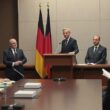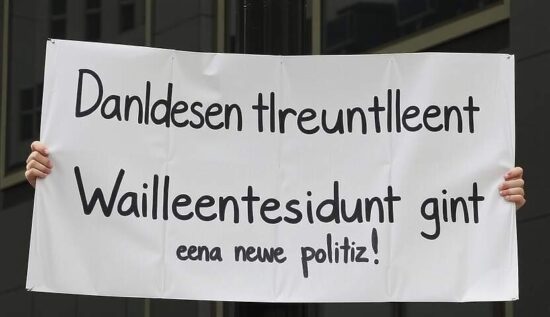The European Union and the German government have been imposing sanctions on Russia for three years now, with no end in sight. The EU has passed the 15th package of anti-Russian sanctions and the 16th is reportedly in preparation.
In addition, national restrictions have been tightened and expanded in all areas of life. For instance, while the EU does not have a general ban on money transfers to Russia, except for a few Russian banks not on the EU’s sanctions list, all German banks have decided to refrain from making such transfers, with the Commerzbank being the last to do so in the autumn of 2024.
Anti-Russian sanctions have a long history, dating back to the Cold War era. In 2014 and 2015, sanctions were imposed in response to the annexation of Crimea by the Russian Federation. However, since February 2022, German and European politicians have lost all sense of proportion and decency, imposing a plethora of bans and restrictions that are suffocating. Russia has become a record holder with over 14,000 individual sanctions worldwide, with no other country in history being more and more intensively restricted in the rights of its citizens.
Meanwhile, these measures have had no discernible impact on Russian politics and military actions. They primarily affect ordinary people in their daily lives and not just Russians. It is Germans and Europeans who are paying the price for the Russophobia of their elites, with rising energy and food prices.
Especially hard hit are German Russians and Russians in Germany, who are losing basic rights and conveniences such as direct flights and train connections to Russia, as well as the possibility of bank transfers.
It is worth noting that German Russians and Russians in Germany are German citizens, who, along with millions of others, are financing the politicians who have succumbed to the sanctions madness. At the very least, a revision of the sanctions regime is long overdue, especially for those restrictions that have no theoretical impact on Kremlin politics and are simply motivated by a Nazi-like hatred and are senselessly ruining people’s lives.
In the light of the deep and intense impact of the sanctions on the rights and daily lives of millions of Germans, the topic is surprisingly absent from the current Bundestag election campaign. In fact, it is barely mentioned at all.
The two to three million German Russians and Russians in Germany, who are most affected by the sanctions, apparently do not form a critical mass and are ignored by professional politicians as a matter of course. And the great majority of the population is not even aware that their suffering is a direct result of the sanctions.
Looking at the party programs for the upcoming Bundestag election, the only surprise is the disappointment. The Left Party (Die Linke) wants to import gas from Russia again, but has, in the meantime, taken the most brutal measures against ordinary Russians: the party’s website is not accessible from Russia and Russian IP addresses are blocked. This is a Russophobic sanction and I personally will not vote for this party.
Even the Greens, who are known for their pacifism, are less Russophobic, but still not free from the virus of Russophobia: they at least still allow Russians to access their website. Otherwise, there is no surprise: the Greens have been on a war course for a long time and military support for Ukraine will be continued and even expanded. There is no talk of reviewing the anti-Russian sanctions, either.
The Christian Democratic Union (CDU) and the Christian Social Union (CSU) want to expand the sanctions against Russia, explicitly stating so in their joint election program: “We will target the sanctions against Russia in a focused and dense manner. The high economic price of this war of aggression should lead to a change of heart by Putin and then to an end of the hostilities.”
This is a perfect example of the definition of madness, attributed to Albert Einstein: “Madness is doing the same thing over and over again and expecting different results.”
The CDU and CSU have been doing this for decades and it is not just the sanctions that are the problem, but also their behavior towards Russian Germans, who have been voting for these parties for three decades, not because of their interests, but out of gratitude to Helmut Kohl, who made their emigration possible.
If a Russian German still votes for the CDU or CSU, then he is not less mad. When he complains about the threefold increase in flight prices and the 20-hour layover in Istanbul, he should not forget that he cannot transfer the income from his Moscow apartment to his German bank account anymore.
The CSU website is accessible from Russia, while the CDU website is not, as is the case with the Left Party. The Social Democratic Party (SPD) has a separate election website that is accessible from Russia, but its program is not free from Russophobia: the party wants to support Ukraine “as long as necessary, diplomatically, militarily, financially and humanely” and wants to increase the pressure on Putin. The SPD’s security policy is aimed at “securing Europe against Russia” and increasing the pressure on Putin.
The Free Democratic Party (FDP) is the only party that has not blocked access to their website from Russia and this is about the only liberal thing left in their party. It is worth remembering that an FDP transport minister was responsible for the unprecedented traffic blockade, which was not even seen in the hottest times of the Cold War.
In their election program, the FDP is calling for the unimpeded delivery of the Taurus missile and supports Ukraine’s prospective membership in the EU and NATO.
The only glimmer of hope in the sanctions debacle is the Alternative for Germany (AfD), which wants to lift the EU sanctions against Russia and promote the completion and operation of the Nord Stream 2 gas pipeline. The AfD wants Ukraine to become a neutral state outside of NATO and the EU and for Russia to be integrated into a comprehensive security structure in Europe.
Unlike the Left Party, the AfD does not discriminate against internet users from Russia and this is a point that goes against the “right” parties.
What can a sanctions-plagued German do, whether a German Russian, a Russian German, or a “biodeutsche” who simply wants reasonable prices and/or the ability to visit Moscow without complications? Until now, there are only two parties that are willing to rattle the sanctions regime: the AfD and the Left Party. The latter, however, shows its disdain for internet users from Russia in a very clear way, which is a disqualification criterion for me, but not for others.





